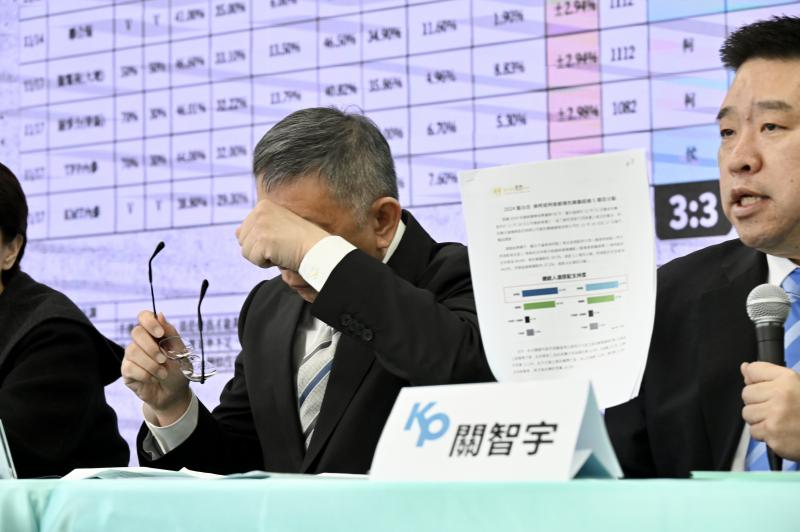The Chinese Nationalist Party (KMT) and Taiwan People’s Party (TPP) on Saturday failed to reach a consensus on a united ballot for the January presidential election due to disagreements over sampling error size and polling methodology.
The two opposition parties on Wednesday announced they were to use public polling to decide who would take the lead spot on the ballot, KMT candidate New Taipei City Mayor Hou You-yi (侯友宜) or TPP Chairman Ko Wen-je (柯文哲).
Each of the parties and former president Ma Ying-jeou (馬英九) picked an expert to analyze polls conducted from Tuesday last week to Friday, with the results to be announced at 10am on Saturday.

Photo: George Tsorng, Taipei Times
However, after discussion late into the night on Friday, the three polling experts failed to reach a consensus, Ma Ying-jeou Foundation director Hsiao Hsu-tsen (蕭旭岑) said.
The TPP representative protested using three of the nine selected surveys, leaving a stalemate over whether they should be included, Hsiao said, without specifying the issues cited.
If the six remaining surveys are analyzed using the statistical margin of error, five support a Hou-Ko ticket, Hsiao said.
However, if a 3-percentage-point margin were used as supported by the TPP, they would be tied at three apiece, he added.
According to their agreed criteria from Wednesday’s meeting, a result within the margin of error would count as a point toward a Hou-Ko ticket, meaning a larger sampling error size would favor the KMT candidate.
The experts have therefore recommended that discussions be continued at a later date, Hsiao said.
At a separate news conference later in the morning, Ko reiterated the importance of forming an opposition alliance.
Ko said he wishes to keep negotiating with the KMT, but could not allow a 6-percentage-point margin of error.
“It’s like asking us to surrender our weapons,” he said.
Asked whether this means the breakdown of an opposition coalition, Ko said that “anything is possible” until the window for candidate registration closes at 5pm on Friday.

The Central Election Commission has amended election and recall regulations to require elected office candidates to provide proof that they have no Chinese citizenship, a Cabinet report said. The commission on Oct. 29 last year revised the Measures for the Permission of Family-based Residence, Long-term Residence and Settlement of People from the Mainland Area in the Taiwan Area (大陸地區人民在台灣地區依親居留長期居留或定居許可辦法), the Executive Yuan said in a report it submitted to the legislature for review. The revision requires Chinese citizens applying for permanent residency to submit notarial documents showing that they have lost their Chinese household record and have renounced — or have never

A magnitude 5.6 earthquake struck off the coast of Yilan County at 12:37pm today, with clear shaking felt across much of northern Taiwan. There were no immediate reports of damage. The epicenter of the quake was 16.9km east-southeast of Yilan County Hall offshore at a depth of 66.8km, Central Weather Administration (CWA) data showed. The maximum intensity registered at a 4 in Yilan County’s Nanao Township (南澳) on Taiwan’s seven-tier scale. Other parts of Yilan, as well as certain areas of Hualien County, Taipei, New Taipei City, Taoyuan, Hsinchu County, Taichung and Miaoli County, recorded intensities of 3. Residents of Yilan County and Taipei received

Taiwan has secured another breakthrough in fruit exports, with jujubes, dragon fruit and lychees approved for shipment to the EU, the Ministry of Agriculture said yesterday. The Animal and Plant Health Inspection Agency on Thursday received formal notification of the approval from the EU, the ministry said, adding that the decision was expected to expand Taiwanese fruit producers’ access to high-end European markets. Taiwan exported 126 tonnes of lychees last year, valued at US$1.48 million, with Japan accounting for 102 tonnes. Other export destinations included New Zealand, Hong Kong, the US and Australia, ministry data showed. Jujube exports totaled 103 tonnes, valued at

BIG SPENDERS: Foreign investors bought the most Taiwan equities since 2005, signaling confidence that an AI boom would continue to benefit chipmakers Taiwan Semiconductor Manufacturing Co’s (TSMC, 台積電) market capitalization swelled to US$2 trillion for the first time following a 4.25 percent rally in its American depositary receipts (ADR) overnight, putting the world’s biggest contract chipmaker sixth on the list of the world’s biggest companies by market capitalization, just behind Amazon.com Inc. The site CompaniesMarketcap.com ranked TSMC ahead of Saudi Aramco and Meta Platforms Inc. The Taiwanese company’s ADRs on Tuesday surged to US$385.75 on the New York Stock Exchange, as strong demand for artificial intelligence (AI) applications led to chip supply constraints and boost revenue growth to record-breaking levels. Each TSMC ADR represents